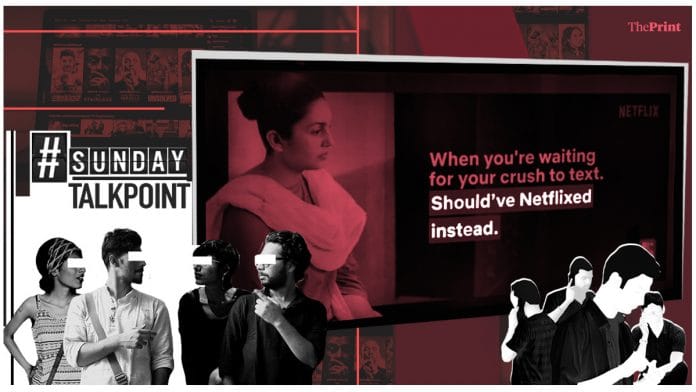Billboards advertising popular Netflix shows like Leila and Sacred Games have popped up across Mumbai and Delhi with the tagline “Should’ve Netflixed instead”. It stresses the streaming platform’s cheap smartphone plan. With 10-20 lakh subscribers in India alone, Netflix has been accused of causing sleep deprivation, impairing fitness goals and causing asocial behaviour.
ThePrint asks: Are Netflix advertisements encouraging Indians to be asocial?
People are not only binge-watching, they are binge-racing. It creates an unhealthy lifestyle
 Manas Gurung
Manas Gurung
Senior video producer, ThePrint
I agree that these advertisements are making people asocial because it takes the asocial concept to the next level. People aren’t just binge-watching, but binge-racing. Watching a show has also become a thing of status where you boast about how many hours you spent watching a show in one sitting. It encourages an unhealthy lifestyle as well, in terms of lethargy, snacking and straining vision. Netflix is also readily accessible on multiple platforms and devices.
I think the platform also has this effect that makes people want to escape reality, which affects their social engagement capabilities as well. Some people even cancel plans to watch a show to the point where life is the alternate Netflix. These ads clearly want people to stay in than go out.
Behavioural change requires a lot of factors. ‘Should have Netflixed instead’ ads can’t be it
 Simrin Sirur
Simrin Sirur
Reporter, ThePrint
The point of Netflix is to bring entertainment to you on demand. Unlike a TV, viewers aren’t at the mercy of channel providers and can watch what they want on any screen, at any time. Could this encourage asocial behaviour? Perhaps it could, but by a long shot.
Netflix has been around for a while now, and our lives are still primarily governed by jobs, family and other commitments. Netflix’s new ad campaign, whose tagline reads “should have Netflixed instead”, can’t be taken literally because it’s a ploy to have you recall Netflix over other streaming platforms, not necessarily a call to forgo your responsibilities and watch it all day.
The ad’s tagline doesn’t have the power to change social behaviour, and it’s not necessarily giving people new ideas of how to spend their time – people in metros have been whiling away transit time watching TV on their phones for a while now, without Netflix having to suggest it. Social change is propelled by multiple factors, and not on a tag line alone.
Netflix can’t change fundamental nature of a person. If someone likes socialising, they’ll do it regardless
 Rachel John
Rachel John
Journalist, ThePrint
It is incorrect to assume that advertisements can alter the fundamental nature of an individual. Advertisements are tools, and quite effective tools at that, developed by capitalists to make certain commodities seem indispensable. Netflix advertisements, in particular, are definitely clever and seem to perfectly understand the demography of Indians who use it.
Implying that staying in and watching a good Netflix series is a better option than encountering a rather exhausting world is appealing to many. However, people who prefer socialising would do so even if Netflix puts out a brilliant advertisement. While advertisements do have a form of soft power, often persuading people to buy things they don’t want, we have not reached the point where they can successfully persuade someone against their nature.
Netflix is definitely a force to be reckoned with and is fast becoming a staple. But it hasn’t quite gotten to a position where it would take precedence over social relations and human interaction, definitely not in India.
Not just Netflix, social media making us more and more anti-social
 Debalina Dey
Debalina Dey
Assistant Editor, ThePrint
Yes. And not just Netflix ads, I think the nature of social media is making us more and more asocial. Digital or print advertisements asking people to ‘Netflix and chill’ does create a distance among them.
People might be socialising online with social media, but it’s creating an inevitable shift in the ways we communicate with each other and is affecting our interpersonal relationships.
Online interaction among people is reducing face-to-face interaction. For example, we tend to scroll through our Instagram feed in silence while travelling in cab or metro; we tweet instead of discussing issues with our friends and colleagues, we text friends instead of meeting them, and binge-watch our favourite show on Netflix while being simultaneously glued to our phones.
We’re becoming anti-social, unconsciously, and Netflix is just cashing in on it.
Netflix ads are consumerism at its very best. Don’t go out, Netflix and chill
 Kairvy Grewal
Kairvy Grewal
Journalist, ThePrint
I think this goes beyond Netflix advertisements. From ‘are you still watching’ to ‘skip recaps and intros’, Netflix is suited for a viewer who doesn’t want any distraction from his or her watching experience.
More than encouraging, I believe that Netflix is benefitting from us being anti-social. What it is also doing is inculcating a fad where being alone and chilling is the new cool thing to do. Not that it ever wasn’t, but now its promoted for those who needed that nudge.
Advertisements like ‘don’t go to a New Year’s Party, watch Ghost Stories instead’ are just consumerism at its very best. Netflix has tailored itself as a product that is a replacement for the company of other humans or any other activity under the sun. With so many options to keep you engaged on Netflix and other streaming services, making the choice of being social is hard, one that I am guilty of.
Also read: Can Netflix India counter the challenge from cheaper Amazon Prime, Hotstar, ALTBalaji?
By Pia Krishnankutty, journalist at ThePrint







Shoddy article! You missed the point behind the campaign and folks on which this campaign has been directed to. It has been an attempt by Netflix to position itself against TV and suggest that in situations where you would have watched TV, you should watch Netflix. It’s intent is not to make people asocial or change their behaviour adversely but tweak it drive higher usage of Netflix against TV.
Netflix one has not watched, but my iPad – actually there are two of them – is my best buddy in life. Brings the world to me. Knowledge, understanding, a spot of entertainment, old film songs, travel, wildlife. Reduces my carbon footprint.